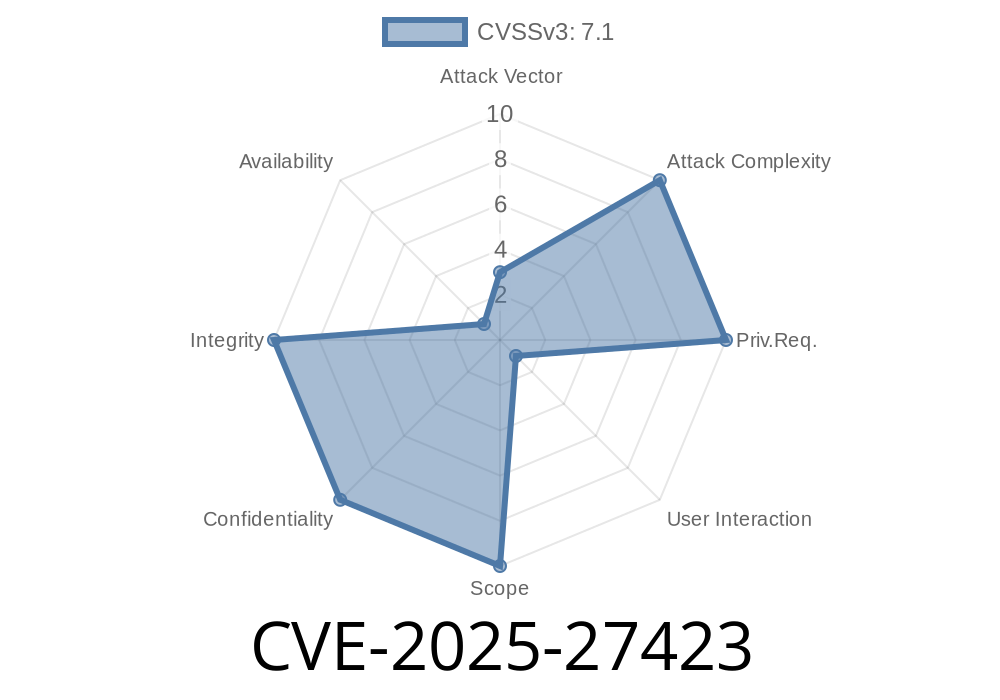A severe vulnerability, identified as CVE-2025-27423, affects the widely-used Vim text editor through its built-in tar.vim plugin. This plugin provides users with a convenient way to view and edit tar files directly from Vim—usually seen as a productivity boost. However, starting from Vim version 9.1.0858, a subtle but critical security slip means opening a maliciously crafted tar archive could lead to the execution of arbitrary shell commands on your computer.
This article will explain the bug, show how it can be exploited, and offer fixes and recommendations—all in straightforward, American English.
The Dangerous Code
When you use the tar.vim plugin, Vim pops open the contents of .tar, .tar.gz, or similar files with simple keystrokes. But here’s the issue: to extract file content from the archive, the plugin started using Vim’s :read command like this:
:read !tar -xOf % tarfile
Here, the :read command runs a shell command and dumps whatever it outputs straight into your buffer, just below the cursor. That’s normally fine, as long as the command and its arguments are under control.
But: As of version 9.1.0858, part of that command is taken directly from a file name—or even worse, the archive meta-data itself—without any sanitization. If an attacker crafts an archive with filenames containing Vim command injection tricks, they can *smuggle shell commands* into the :read ! line.
What Does This Mean?
If you open a malicious tar file, you could be running commands on your computer you never meant to. Depending on your Vim settings (especially your $SHELL and 'shell' options), this could mean anything from leaking files to installing malware.
Exploit Example
Let’s get down to brass tacks: Here’s a simple proof of concept using shell commands and Python to create an "evil" tar file.
Suppose you want to pop up gnome-calculator for demonstration
touch ';gnome-calculator;'
2. Add it to a Tar Archive
tar cf evil.tar ';gnome-calculator;'
Open the tar archive using Vim with the tar.vim plugin (this may happen automatically)
vim evil.tar
When Vim’s plugin processes the archive, it builds a shell command like
tar -xOf evil.tar ';gnome-calculator;'
If the shell interprets that filename as intended, it runs gnome-calculator. Of course, attackers can replace gnome-calculator with far more dangerous commands: stealing your files, installing backdoors, or anything their permissions allow.
Note
The impact depends on your shell and configuration. On many systems, the classic Bash shell will interpret this malicious filename and allow the command to execute.
Reference Links
- GitHub Advisory — Vim tar.vim Plugin Command Injection
- Vim Patch Fixing the Issue (v9.1.1164)
- Official Vim Website
- NVD Record: CVE-2025-27423
How Was This Fixed?
The bug has been addressed in Vim patch v9.1.1164. The fix checks and sanitizes the tar archive’s contents before building a shell command, ensuring nothing sneaky slips through.
Here’s a cleaned-up, safe way
" now properly escapes/sanitizes filenames from the tar archive
:read !tar -xOf % -- 'sanitize-filename.tar'
Recommendations
- Upgrade Vim Immediately if you’re using tar.vim, especially versions between 9.1.0858 and 9.1.1164.
- Avoid Opening Untrusted Tar Files in Vim—the exploit is fire-and-forget once you load a malicious archive.
- Check your $SHELL and Vim's 'shell' Configs; more secure or restrictive shells reduce the attack surface.
- Watch for similar issues in other plugins that pass filenames or archive content straight to the shell without checking it.
Conclusion
CVE-2025-27423 shows how even trusted, mature software can gain new risks through feature enhancements. It’s a great reminder to keep your editor up to date, be careful where files come from, and be wary of plugins that mix archives and shell commands.
Protect yourself: Always keep Vim and your plugins patched, and spread the word to your colleagues—especially those who hack daily in the command line.
*Stay safe, keep your tools fresh, and never underestimate a crafty tarball!*
References
- CVE-2025-27423: NVD Record
- Vim Patch Fix
- Vim tar.vim Plugin Docs
Let me know if you want a full demo or code to check your own Vim install!
Timeline
Published on: 03/03/2025 17:15:15 UTC
Last modified on: 05/02/2025 23:15:16 UTC
